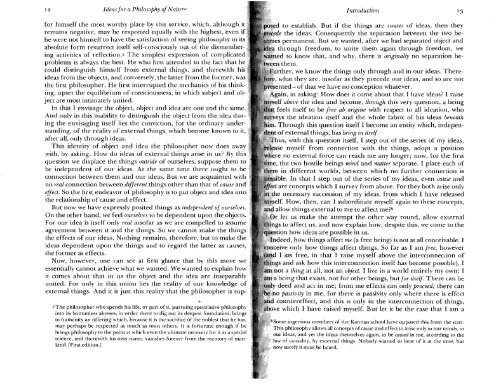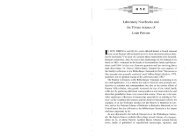Ideas for a Philosophy of Nature
Ideas for a Philosophy of Nature
Ideas for a Philosophy of Nature
You also want an ePaper? Increase the reach of your titles
YUMPU automatically turns print PDFs into web optimized ePapers that Google loves.
12<strong>Ideas</strong><strong>for</strong> a <strong>Philosophy</strong> <strong>of</strong><strong>Nature</strong>Introduction 13<strong>for</strong> himself the most worthy place by this service, which, although itremains negative, may be respected equally with the highest, even ifhe were not himself to have the satisfaction <strong>of</strong> seeing philosophy in itsabsolute <strong>for</strong>m resurrect itself self-consciously out <strong>of</strong> the dismemberingactivities <strong>of</strong> reflection." The simplest expression <strong>of</strong> complicatedproblems is always the best. He who first attended to the fact that hecould distinguish himself from external things, and therewith hisideas from the objects, and conversely, the latter from the <strong>for</strong>mer, wasthe first philosopher. He first interrupted the mechanics <strong>of</strong> his thinking,upset the equilibrium <strong>of</strong> consciousness, in which subject and objectare most intimately united.In that I envisage the object, object and idea are one and the same.And only in this inability to distinguish the object from the idea duringthe envisaging itself lies the conviction, <strong>for</strong> the ordinary understanding,<strong>of</strong> the reality <strong>of</strong> external things, which become known to it,after all, only through ideas.This identity <strong>of</strong> object and idea the philosopher now does awaywith, by asking: How do ideas <strong>of</strong> external things arise in us? By thisquestion we displace the things outside <strong>of</strong> ourselves, suppose them tobe independent <strong>of</strong> our ideas. At the same time there ought to beconnection between them and our ideas. But we are acquainted withno real connection between dIfferent things other than that <strong>of</strong> cause andeffect. So the first endeavor <strong>of</strong> philosophy is to put object and idea intothe relationship <strong>of</strong> cause and effect.But now we have expressly posited things as independent <strong>of</strong> ourselves.On the other hand, we feel ourselves to be dependent upon the objects.For our idea is itself only real ins<strong>of</strong>ar as we are compelled to assumeagreement between it and the things. So we cannot make the thingsthe effects <strong>of</strong> our ideas. Nothing remains, there<strong>for</strong>e, but to make theideas dependent upon the things and to regard the latter as causes,the <strong>for</strong>mer as effects.Now, however, one can see at first glance that by this move weessentially cannot achieve what we wanted. We wanted to explain howit comes about that in us the object and the idea are inseparablyunited. For only in this union lies the reality <strong>of</strong> our knowledge <strong>of</strong>external things. And it is just this reality that the philosopher is sup5 The philosopher who spends his life, or part <strong>of</strong> it, pursuing speculative philosophyinto its bottomless abysses, in order there to dig out its deepest foundation, bringsto humanity an <strong>of</strong>fering which, because it is the sacrifice <strong>of</strong> the noblest that he has,may perhaps be respected as much as most others. It is <strong>for</strong>tunate enough if hebrings philosophy to the point at which even the ultimate necessity <strong>for</strong> it as a specialscience, and therewith his own name, vanishes <strong>for</strong>ever from the memory <strong>of</strong> mankind.[First edition.]d to establish. But if the things are causes <strong>of</strong> ideas, then they:e the ideas. Consequently the separation between the two bespermanent. But we wanted, after we had separated object andthrough freedom, to unite them again through freedom, weted to know that, and why, there is originally no separation benthem.rther, we know the things only through and in our ideas. There, what they are, ins<strong>of</strong>ar as they precede our ideas, and so are notnted - <strong>of</strong> that we have no conception whatever.ain, in asking: How does it come about that I have ideas? I raiseIf above the idea and become, through this very question, a beingfeels itself to be free ab origine with respect to all ideation, whoys the ideation itself and the whole fabric <strong>of</strong> his ideas beneath. Through this question itself I become an entity which, indepen<strong>of</strong>external things, has being in itself:us, with this question itself, I step out <strong>of</strong> the series <strong>of</strong> my ideas,e myself from connection with the things, adopt a positione no external <strong>for</strong>ce can reach me any longer; now, <strong>for</strong> the first, the two hostile beings mind and matter separate. I place each <strong>of</strong>in different worlds, between which no further connection isible. In that I step out <strong>of</strong> the series <strong>of</strong> my ideas, even cause andare concepts which I survey from above. For they both arise onlye necessary succession <strong>of</strong> my ideas, from which I have releasedIf. How, then, can I subordinate myself again to these concepts,allow things external to me to affect me?"'r let us make the attempt the other way round, allow externals to affect us, and now explain how, despite this, we come to thetion how ideas are possible in us.deed, how things affect me (a free being) is not at all conceivable. Ieive only how things affect things. So far as I am free, howeverI am free, in that I raise myself above the interconneccion <strong>of</strong>s and ask how this interconnection itself has become possible), Iot a thing at all, not an object. I live in a world entirely my own; Ibeing that exists, not <strong>for</strong> other beings, but<strong>for</strong> itself There can bedeed and act in me; from me effects can only proceed; there cano passivity in me, <strong>for</strong> there is passivity only where there is effectcountereffect, and this is only in the interconnection <strong>of</strong> things,ve which I have raised myself. But let it be the case that I am aSome ingenious members <strong>of</strong> the Kantian school have opposed this from the start.This philosophy allows all concepts <strong>of</strong>cause and effect to arise only in our minds, inour ideas, and yet the ideas themselves again, to be caused in me, according to thelaw <strong>of</strong> causality, by external tltings. Nobody wanted to hear <strong>of</strong> it at the time; butnow surely it must be heard.



